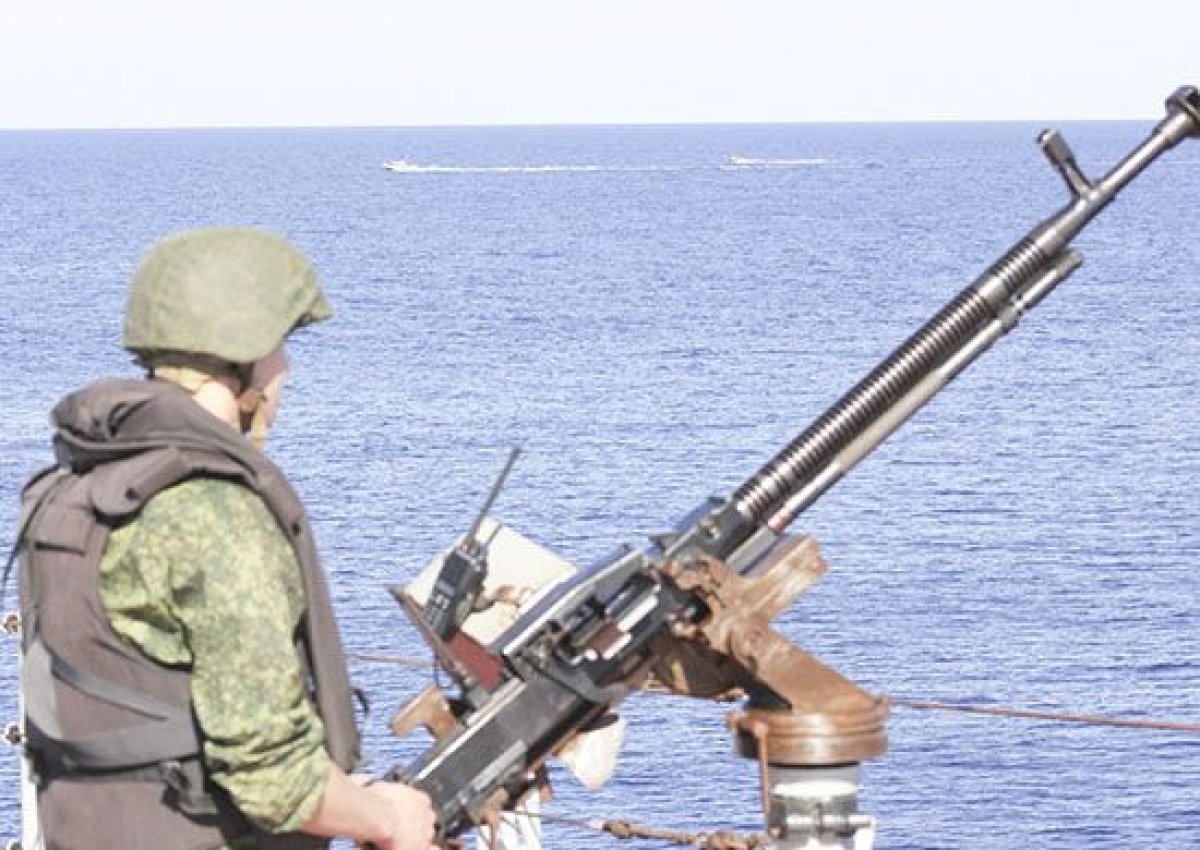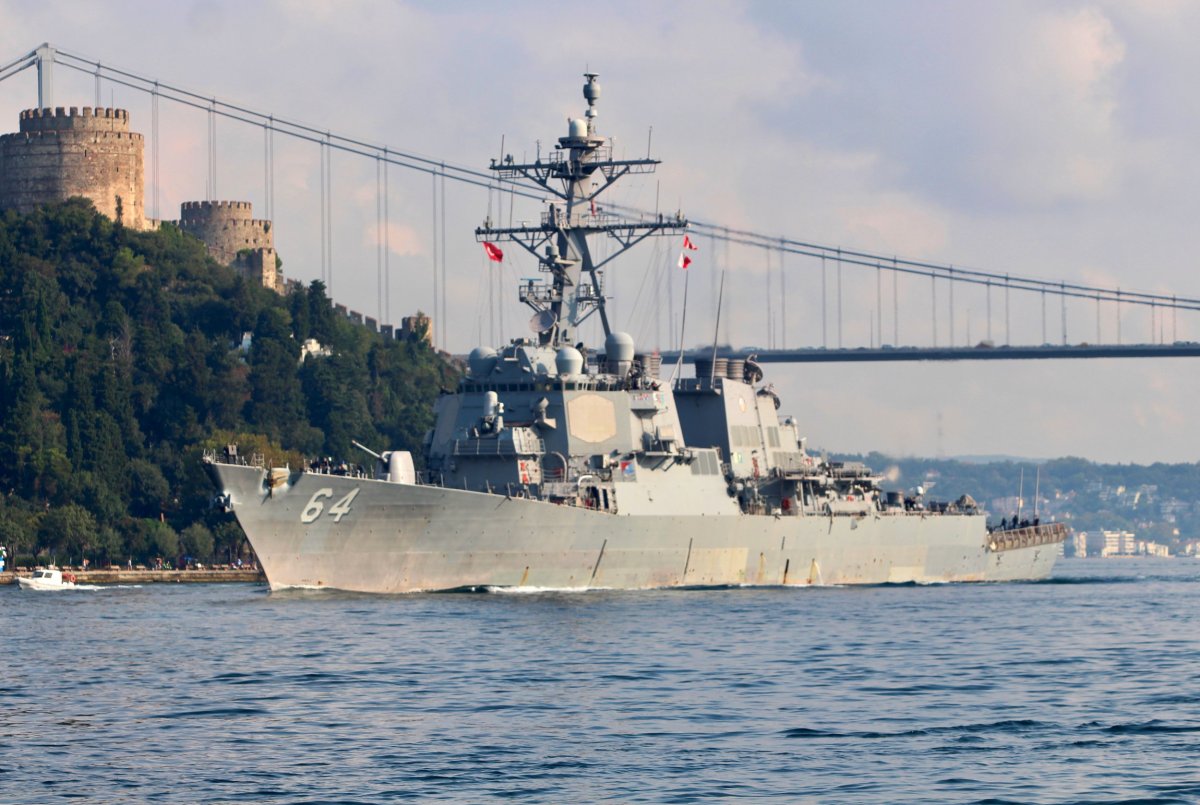Russia has said the United States and its Western allies could amass the forces needed to attack Syria in just over a day, claiming they were preparing to do so under the false pretense of a staged chemical attack.
Despite the Pentagon's denials that it was building up its forces in the region, Moscow has insisted that the U.S. was gearing up for military action against Syria, where the two powers support rival factions in a seven-year civil war. Russian Foreign Ministry spokesperson Maria Zakharova warned reporters Thursday that "the clouds are gathering again" over Syria as the U.S. threatened to respond harshly to any instances of chemical weapons attacks that Syrian President Bashar al-Assad and his international allies have denied conducting.
"They [the United States] may build up missile capabilities for strikes on Syria in just over 24 hours. Currently, the strike grouping of the United States, France and Great Britain comprises strategic and tactical aircraft at airbases in Jordan, Kuwait and Crete. It consists of about 70 carriers, around 380 airborne cruise missiles and also two U.S. destroyers Carney and Ross, with each carrying 28 Tomahawks on its board," Zakharova said, according to the state-run Tass Russian News Agency.
"In the Mediterranean Sea, the grouping of missile carriers can be reinforced over just one day's passage with two more U.S. destroyers, namely, the Donald Cook and the Porter, which are now staying at the base in the Spanish town of Rota, and also with submarines," she added. "In the Red Sea, the guided missile destroyer Jason Dunham can arrive within the same period while The Sullivans in the Persian Gulf can return to the attack position."

Since sponsoring insurgent efforts to overthrow Assad in the wake of 2011 uprising backed by the West, Turkey and Gulf Arab states, the U.S. and its allies shifted their efforts toward defeating the Islamic State militant group (ISIS) in 2014. Under President Donald Trump, the U.S. further cut support for the Syrian opposition and even floated a potential alliance between Washington and Moscow, which intervened in 2015 to help Assad's beleaguered armed forces overcome both rebels and jihadis.
Since Trump took office in early 2017, however, he has twice ordered missile strikes on Syrian government territory in response to allegations that the Syrian military had used internationally outlawed poison gas in operations against hostile enclaves. Syria, along with Russia and Iran, has accused local and foreign foes of staging the attacks to frame Assad. Amid U.S. warnings that another alleged chemical attack was to occur in the upcoming Syrian operation to retake the final Islamist-held bastion of Idlib, Russia has claimed that the West was looking to conspire with local militants in a "false flag" operation.
"There is an active preparation for the staging of the use of chemical weapons by government forces in the Idlib area in the hopes that the United States will then launch missile strikes on government troops," Zakharova said, according to the Russian Foreign Ministry. "Judging by the preparations of the U.S. armed forces in the Middle East region, the possibility of new missile strikes against objects in Syria cannot be ruled out."
"Once again I would like to emphasize that, through this, the United States will set back all the measures taken on the Syrian peace settlement," she added.
Russia, Iran and Turkey have spearheaded efforts to reconcile the Syrian government and opposition forces, while the U.S. has supported self-administration for a mostly Kurdish group known as the Syrian Democratic Forces that is in control of about a quarter of the country. The U.S.-backed Syrian Democratic Forces' political wing, however, has entered into direct talks with the government, which only regards Russia and Iran as legitimate partners and has called on the U.S., Turkey and other international forces to withdraw immediately.


Defense Secretary James Mattis told reporters Tuesday that the U.S. was in "recent active communication" with Russia over the developing situation. That same day, in a statement sent to Newsweek, a Pentagon spokesperson said, "Russian reports of a U.S. military buildup in the Eastern Med are false. However, we are prepared to respond should the President direct such an action. We remain concerned over reports of a potential military offensive by the Syrian regime against civilians and civilian infrastructure in Idlib, which would result in devastating humanitarian consequences."
Russia has sought to prepare for potential action anyway, sending its largest-ever armada to the Mediterranean Sea. Following anti-terrorism naval drills by its Northern Fleet, the Russian Defense Ministry announced Thursday that it would hold a week-long large-scale exercise in the region starting Saturday, involving up to 25 warships and 30 aircraft. The fleet would practice "air defense, anti-submarine and anti-sabotage warfare and also mine counter-measures support," according to Tass.
The Russian Defense Ministry has said that the Pentagon must collaborate with Moscow and Damascus or withdraw from the conflict in Syria, something that Trump has expressed a desire to do, with the defeat-ISIS mission nearly accomplished. U.S. officials have pushed for a political transition and a limit to Iranian influence, however. Following talks with his Syrian counterpart Walid al-Muallem, Russian Foreign Minister Sergey Lavrov accused the U.S. of pursuing its own agenda to the detriment of efforts to find a comprehensive solution to the conflict.
"I would like to stress once again that unilateral actions will lead us nowhere," Lavrov said, according to his ministry. "We all had to have learned at least something from the situation that developed with the invasion of Iraq and the aggression against Libya. The problem of Syria and the region can only be solved through collective action without any hidden unilateral agendas and double standards. We are still, as before, ready to work openly with all external players, and, of course, with the countries of the region."
Uncommon Knowledge
Newsweek is committed to challenging conventional wisdom and finding connections in the search for common ground.
Newsweek is committed to challenging conventional wisdom and finding connections in the search for common ground.
About the writer
Based in his hometown of Staten Island, New York City, Tom O'Connor is an award-winning Senior Writer of Foreign Policy ... Read more
To read how Newsweek uses AI as a newsroom tool, Click here.








